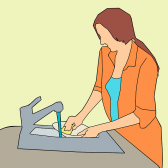
Homekitchenmagazine.com | Vegetable Cooking Mistakes That You Should Avoid – Vegetables become foodstuffs that are often used as a daily meal menu. There are a variety of delicious dishes from processed vegetables such as vegetable soup, sauteed kale, cap cay, and many more.
Besides being delicious, vegetables are also a healthy food. Vegetables contain a number of nutrients that can meet daily needs. Starting from fiber, vitamins, minerals, carbohydrates, to antioxidants. No wonder, the vegetable menu is never absent at the dinner table.
Not only that, eating vegetables is also beneficial for the health of the body. Eating vegetables can prevent anemia, heart disease risk, and can prevent diabetes.
However, behind the process of making dishes using vegetables, there are some mistakes that are often made. Although it may seem trivial, mistakes in cooking these vegetables will actually eliminate their nutrients.
Vegetable Cooking Mistakes That You Should Avoid
Carelessly storing vegetables
Carelessly storing vegetables is a bad thing. Not all types of vegetables can be mixed into one, separately according to the type.
Vegetables are kept still wrapped in plastic
The next Vegetable Cooking Mistakes That You Should Avoid is vegetables are kept still wrapped in plastic.
Vegetables are kept still wrapped in plastic is not the right thing, it can make it rotten because it is not exposed to air
Read also:
Four signs of frozen food in the refrigerator should be disposed of
Not washing vegetables
Generally, conventionally grown vegetables contain peptides. As in celery, spinach, peppers, and tomatoes.
If you miss washing vegetables and cooking them right away, you will most likely swallow chemical residues that are harmful to health. It can cause abdominal pain, nausea, to diarrhea.
The worst part is these chemicals don’t just come and go. They hide inside our fat cells until we go on a diet and start losing weight. According to researchers, as the weight begins to drop, chemicals come out of hibernation and into the bloodstream, slowing energy expenditure as well as metabolism.
Therefore, never miss washing vegetables. Even if you always buy organic vegetables. Then, before cooking, soak the vegetables in a saucepan for 10-15 minutes before eating them. Then rinse again with running water to make sure it is clean.
Peeling vegetable skins
The next Vegetable Cooking Mistakes That You Should Avoid is peeling the vegetable skins.
Many people have a habit of peeling vegetable skins in the hope of making them cleaner. In fact, the skin that you throw away actually contains the most nutrients.
The vegetable skin contains beneficial nutrients. The amount of nutrients varies by type of vegetable. However, in general, unpeeled products contain higher amounts of vitamins, minerals and other beneficial plant compounds, compared to peeled products.
Vegetable skins also contain more fiber and anti-oxidants. For example, up to 31% of the total amount of fiber in a vegetable can be found on its skin. What’s more, anti-oxidant levels can reach 328 times higher on the skin than in meat. Therefore, eating unpeeled vegetables can actually increase nutritional intake.
Cutting Vegetables of Unequal Size
Can you cook carrots and peppers at the same time? There’s no problem when you want to cook vegetables like carrots, peppers, and mushrooms at the same time. However, it is necessary to know that to cut it the same size. It is useful so that the vegetables ripen evenly when cooked.
Not immediately cooking vegetables that have been cut
Not immediately cooking vegetables that have been cut will make them oxidized. Color and freshness of vegetables so reduced.
In addition to oxidizing, cutting too early also causes the nutrients and quality of vegetables to disappear. In fact, it can rot if left too long.
Boiling Vegetables Too Long
Can you boil broccoli for a long time? Boil vegetables naturally, not too long. To get the texture to stay crispy, you can steam broccoli or other vegetables until cooked and soak them in ice water to stop the maturation process.
You can reheat the vegetables in the pan for a few seconds to warm them up.
Using all kinds of oils
Is it safe to saute vegetables? Sautéing is one good way to maintain nutrient levels in vegetables, but also pay attention to the type of oil used. Unsaturated fats in certain oils such as canola oil and sunflower seed oil can be oxidized in high heat and turn toxic.
Read also:
Tips For Making The Perfect Potato Salad + Recipe



